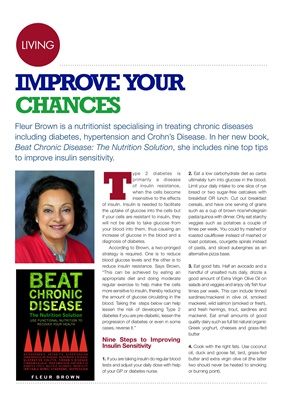
LIVINGLIVING
IMPROVE YOUR
CHANCES
Fleur Brown is a nutritionist specialising in treating chronic diseases
including diabetes, hypertension and Crohn's Disease. In her new book,
Beat Chronic Disease: The Nutrition Solution, she includes nine top tips
to improve insulin sensitivity.
T
ype 2 diabetes is
primarily a disease
of insulin resistance,
when the cells become
insensitive to the effects
of insulin. Insulin is needed to facilitate
the uptake of glucose into the cells but
if your cells are resistant to insulin, they
will not be able to take glucose from
your blood into them, thus causing an
increase of glucose in the blood and a
diagnosis of diabetes.
According to Brown, a two-pronged
strategy is required. One is to reduce
blood glucose levels and the other is to
reduce insulin resistance. Says Brown,
"This can be achieved by eating an
appropriate diet and doing moderate
regular exercise to help make the cells
more sensitive to insulin, thereby reducing
the amount of glucose circulating in the
blood. Taking the steps below can help
lessen the risk of developing Type 2
diabetes if you are pre-diabetic, lessen the
progression of diabetes or even in some
cases, reverse it."
Nine Steps to Improving
Insulin Sensitivity
1. If you are taking insulin do regular blood
tests and adjust your daily dose with help
of your GP or diabetes nurse.
2. Eat a low carbohydrate diet as carbs
ultimately turn into glucose in the blood.
Limit your daily intake to one slice of rye
bread or two sugar-free oatcakes with
breakfast OR lunch. Cut out breakfast
cereals, and have one serving of grains
such as a cup of brown rice/wholegrain
pasta/quinoa with dinner. Only eat starchy
veggies such as potatoes a couple of
times per week. You could try mashed or
roasted cauliflower instead of mashed or
roast potatoes, courgette spirals instead
of pasta, and sliced aubergines as an
alternative pizza base.
3. Eat good fats. Half an avocado and a
handful of unsalted nuts daily, drizzle a
good amount of Extra Virgin Olive Oil on
salads and veggies and enjoy oily fish four
times per week. This can include tinned
sardines/mackerel in olive oil, smoked
mackerel, wild salmon (smoked or fresh),
and fresh herrings, trout, sardines and
mackerel. Eat small amounts of good
quality dairy such as full fat natural organic
Greek yoghurt, cheeses and grass-fed
butter
4. Cook with the right fats. Use coconut
oil, duck and goose fat, lard, grass-fed
butter and extra virgin olive oil (the latter
two should never be heated to smoking
or burning point).